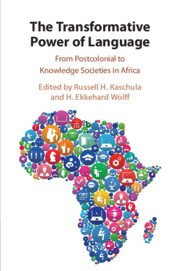Book contents
- The Transformative Power of Language
- The Transformative Power of Language
- Copyright page
- Contents
- Figures
- Tables
- Contributors
- Preface
- Abbreviations and Acronyms
- Introduction
- Part I Mental Decolonisation and Cultural Diversity
- 1 The Role of African Languages in Decolonising South African Universities
- 2 Adapt or Die
- 3 Decolonising Our Minds, Decolonising Our Languages
- Part II Multilingualism and Intellectualisation of African Languages
- Part III Digitalisation and Democratisation of Knowledge
- Part IV Interlingual and Intercultural Cross-Fertilisation
- Index
- References
1 - The Role of African Languages in Decolonising South African Universities
from Part I - Mental Decolonisation and Cultural Diversity
Published online by Cambridge University Press: 18 September 2020
- The Transformative Power of Language
- The Transformative Power of Language
- Copyright page
- Contents
- Figures
- Tables
- Contributors
- Preface
- Abbreviations and Acronyms
- Introduction
- Part I Mental Decolonisation and Cultural Diversity
- 1 The Role of African Languages in Decolonising South African Universities
- 2 Adapt or Die
- 3 Decolonising Our Minds, Decolonising Our Languages
- Part II Multilingualism and Intellectualisation of African Languages
- Part III Digitalisation and Democratisation of Knowledge
- Part IV Interlingual and Intercultural Cross-Fertilisation
- Index
- References
Summary
The chapter contextualises the current status of African languages in South African universities. The lack of development of African languages for teaching and learning purposes was not incidental. The apartheid government sought to diminish the status of African languages while centring that of English as the premium language of teaching and learning, followed by Afrikaans. With the dawn of democracy in 1994 and the inclusion of many African languages as official languages by the new government, the stage was set for addressing language issues in schools and higher education. Yet it was only when the 2015 South African student movements burst onto scene with calls to decolonise institutions of higher learning that the question of the role of African languages in transforming South African universities was brought into focus. It is crucial to note that decolonising our universities is not about lowering the status of English or other canons but about opening up dialogue with other epistemic traditions and canons with teaching and learning taking place from an African context as a point of departure and with African languages at the forefront in universities of the South.
- Type
- Chapter
- Information
- The Transformative Power of LanguageFrom Postcolonial to Knowledge Societies in Africa, pp. 33 - 42Publisher: Cambridge University PressPrint publication year: 2020
References
- 2
- Cited by

